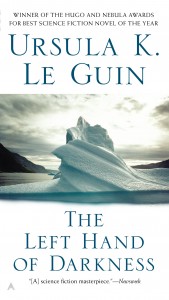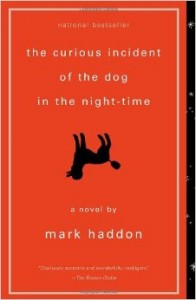Everyone communicates in some manner every day. We use emails, phone calls, and face-to-face conversations to share ideas, information, and feelings with other people. What happens, though, when communication is hindered by language, developmental disorders, or other barriers? Or when there’s a misunderstanding? Those obstacles can affect our relationships and prevent us – or our characters – from achieving the goal at hand.
Sounds like the perfect makings for a story, right? That’s why we’ll look at communication as a literary theme in this edition of Theme: A Story’s Soul. Using two books from different genres, we’ll see how character interactions can impact plot and story goals, and which elements can help us study communication in our own work.
Examples of Communication as a Theme in Ursula K. Le Guin’s The Left Hand of Darkness (Science Fiction)
 The Left Hand of Darkness chronicles Genly Ai’s efforts to convince the people of the planet Gethen to join an intergalactic trade coalition. Part of Genly’s struggles with this task is learning to accept the Gethenians, an androgynous race that assumes male or female characteristics depending on the lunar cycle. The other part is dealing with technological and interpersonal communication issues.
The Left Hand of Darkness chronicles Genly Ai’s efforts to convince the people of the planet Gethen to join an intergalactic trade coalition. Part of Genly’s struggles with this task is learning to accept the Gethenians, an androgynous race that assumes male or female characteristics depending on the lunar cycle. The other part is dealing with technological and interpersonal communication issues.
For his mission, Genly uses an ansible (radio transmitter) to show the Gethenians how they can send messages across space and communicate with other coalition members. However, Gethen’s top politicians show little belief in the device’s benefits. King Argaven of Karhide discards the recorded messages and rejects the invitation by calling Genly a liar (“A bag of tricks and a trickster. You want me to believe you, your tales and messages.… We want nothing from [the Ekumen].”) (41). Later, the Orgoreyn Commensals humor Genly to several meetings but decline his offers to demonstrate the ansible’s functions – only to take the ansible from Genly and send him into exile. As Genly learns from both failures, people aren’t always willing to communicate if they’re given the means to do so.
Notice how manipulation (perceived or real) taints those interactions. This happens throughout Left Hand, including between the Gethenians. When Pemmer Harge rem ir Tibe becomes King Argaven’s new adviser, he takes to Karhide’s radios to rally his nation to war against Orgoreyn. His speeches are “long and loud” and filled with “praises of Karhide, disparagements of Orgoreyn, vilifications of ‘disloyal factions,’… He wanted his hearers to be frightened and angry.” (108) In other words, Tibe speaks with the intention to deceive his countrymen and further his own ambitions. It’s also interesting that, like Genly with the ansible, Tibe prefers to deliver his messages via radio and not in person.
Examples of Communication as a Theme in Mark Haddon’s The Curious Incident of the Dog in the Night-Time (Fiction)
 The Curious Incident of the Dog in the Night-Time isn’t just a novel about 15-year-old Christopher Boone playing detective when his neighbor’s poodle is killed. It’s also a story about a boy with Asperger syndrome, which impairs his social interaction abilities. It’s therefore no surprise that his troubles with communication allow it to emerge as a theme.
The Curious Incident of the Dog in the Night-Time isn’t just a novel about 15-year-old Christopher Boone playing detective when his neighbor’s poodle is killed. It’s also a story about a boy with Asperger syndrome, which impairs his social interaction abilities. It’s therefore no surprise that his troubles with communication allow it to emerge as a theme.
For example, Christopher struggles with nonverbal communication. He has difficulty with recognizing facial expressions and the many meanings that eyebrow-raising or sighing can have due to emotional context. This confusion mushrooms when Christopher meets strangers. He says they’re “hard to understand” and likens interacting with them to visiting France, “because if you went into a shop or restaurant or on a beach you couldn’t understand what anyone was saying, which was frightening.” (34 – 35) Imagine experiencing this kind of communication barrier on a daily basis. Overwhelming, isn’t it?
When Christopher interviews his neighbors – strangers to him – as part of his investigation, it’s clear he’s leaping out of his comfort zone. He makes the effort despite its challenges, though; and as he puts it, “… talking to the other people in our street was brave. But if you are going to do detective work you have to be brave, so I had no choice.” (35) People often need to communicate regardless of barriers and other issues, and doing so might demand courage or initiative on our part.
Misunderstandings also impact communications throughout Curious Incident. At one point, Christopher’s conversation with a shopkeeper escalates into an argument. Christopher, who interprets things literally, misconstrues the shopkeeper’s slang (“… I realized that he meant £2.95 when he said Two ninety-five.” (187)); while the shopkeeper grows irritated by Christopher’s pointed questions. This and other scenes remind us that how we send our messages (word choice, tone of voice, etc.) can affect how people interpret those messages.
Keys to Exploring Communication as a Literary Theme
Like with our case study on family, character relationships and interactions are instrumental in examining communication as a theme. Here are parallels from The Left Hand of Darkness and The Curious Incident of the Dog in the Night-Time that aid in that examination:
Communication Barriers:
Language, geographic distance, cultural differences (Genly and the Gethenians in Left Hand), and developmental disorders (Christopher’s Asperger syndrome in Curious Incident) are some of the obstacles that can inhibit a character’s ability to communicate.
Misunderstandings and Failures:
In both novels, communications between characters go awry due to misinterpretation, technological malfunction, and other reasons. These breakdowns show the consequences of unsuccessful interactions and add tension to the plot.
Methods of Communication:
Genly and Tibe use radio technology to send typed or spoken messages in Left Hand. Christopher’s mother writes letters to explain why she left their family in Curious Incident. What other means can characters use to communicate?
Honesty versus Dishonesty:
Consider the speaker’s motivations for communicating. Will he be honest or, like Tibe in Left Hand, deceptive? Also, does the receiver perceive or interpret the message as genuine? What would influence his reaction? For example, King Argaven refuses to believe Genly because he fears how Gethen will change by joining the coalition.
Nonverbal Communication: Remember how Christopher wrestled with understanding facial expressions in Curious Incident? Body language is essential in communication because it provides emotional context that words don’t always reveal, including whether the speaker is lying or hiding a secret.
Roles in Society:
Left Hand features diplomats, politicians, and royalty. Curious Incident presents a boy detective. All of these roles require communication (asking questions, debating, active listening, etc.) as part of their work.
Most importantly, communication arises as a literary theme when it’s integral to the story. Genly’s goal requires persuading an alien race to interact with the rest of the universe. Christopher’s struggles with socializing, on the other hand, hinder his ability to achieve his goal. A plot that relies on successful character connections can help you highlight what people can gain by communicating – and what they stand to lose if they don’t.
It’s Your Turn!
What stories have you read that explore communication as a literary theme? How does the author accomplish this?
Write a story in which characters need to communicate in order to achieve a mutual goal. What complications might these characters experience when they interact? How would this create conflict?
What kinds of communication breakdowns have you recently experienced? What could have been done (either on your part or on others’) to help that interchange be more successful?
What topics would you like to see featured at Theme: A Story’s Soul? Share your thoughts by commenting below or tweeting me at @SaraL_Writer with the hashtag #AStorysSoul.
…………….
 Sara Letourneau is a Massachusetts-based writer who practices joy and versatility in her work. In addition to writing a fantasy novel, she reviews tea at A Bibliophile’s Reverie and is a guest contributor for Grub Street Daily. She’s also a published poet whose works have appeared in The Curry Arts Journal, Soul-Lit, The Eunoia Review, Underground Voices, and two anthologies. Learn more about Sara at her personal blog, Facebook, and Twitter.
Sara Letourneau is a Massachusetts-based writer who practices joy and versatility in her work. In addition to writing a fantasy novel, she reviews tea at A Bibliophile’s Reverie and is a guest contributor for Grub Street Daily. She’s also a published poet whose works have appeared in The Curry Arts Journal, Soul-Lit, The Eunoia Review, Underground Voices, and two anthologies. Learn more about Sara at her personal blog, Facebook, and Twitter.






